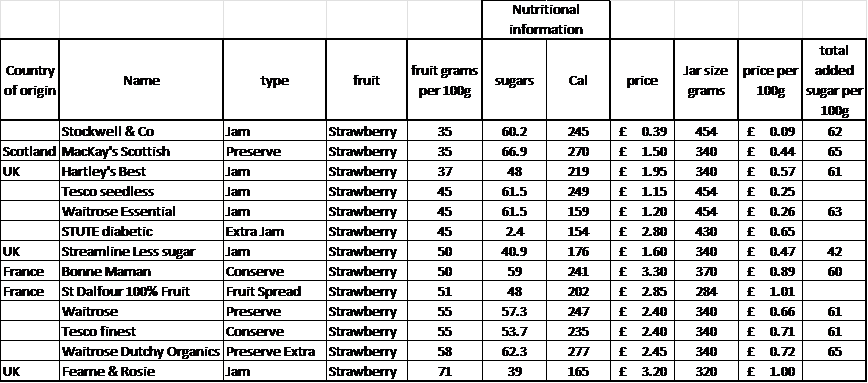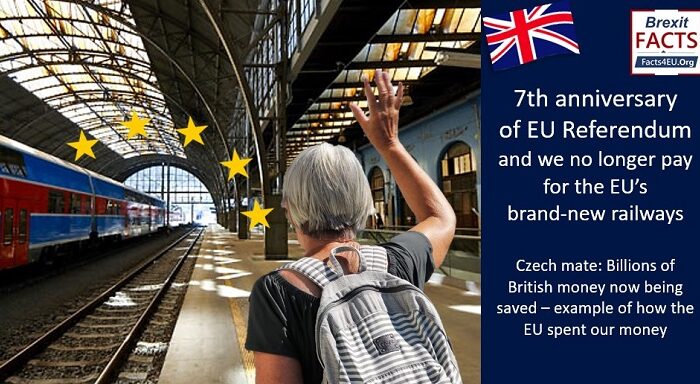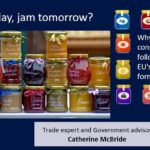Jam today, jam tomorrow?
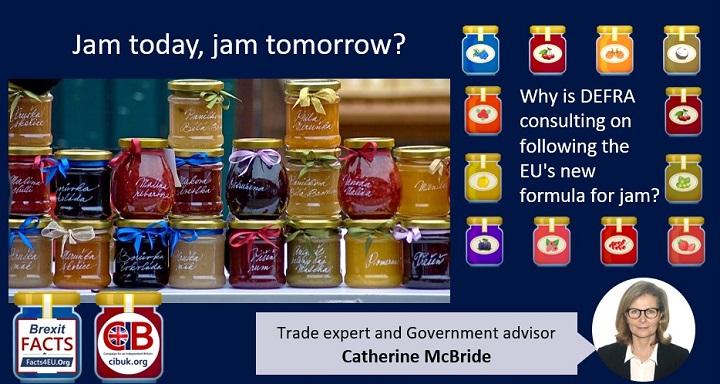
Why is DEFRA consulting on following the EU’s new formula for jam?
Trade specialist Catherine McBride exposes the fruity facts about our love for jams and conserves
In this article for CIBUK and Brexit Facts4EU, Catherine McBride exposes the facts and questions why the government continues to be reluctant to diverge from EU rules.
About the author : Catherine McBride is an economist and a member of the Trade and Agriculture Commission (TAC). The TAC is an independent expert committee which advises the government. It comprises specialists in:
- UK animal and plant health standards
- UK animal welfare standards
- UK environmental standards as they relate to agricultural products
- International trade law and policy

The beauty of Brexit is that we can decide for ourselves what we want to eat
By Catherine McBride
The EU is proposing to change the formula of jam – it must now contain at least 45g of fruit per 100g. Some are proposing that the UK must follow suit in order to protect our tiny EU jam exports, which amount to one seventh of our EU jam imports. But both exports to and imports from the EU are a fraction of total UK domestic jam consumption. Defra plans to consult UK ‘interested parties’ about following the EU’s rules but isn’t it time that the UK population reminded the government that they can make up their own mind about what they want to eat and how much they want to pay for it.
The Telegraph appears to believe that jam is a big UK export, and that the EU is a big market for UK jam and so it published an article implying that the UK should be following the EU’s rules.
The Telegraph article claims the UK exports 10.6 million kilos, (10.6 thousand tonnes), of jam but this appears to include citrus marmalades and nut purees which aren’t affected by the EU’s proposed rule changes. ITC COMTrade figures show the UK exported only 6 thousand tonnes of HS 200799 jams jellies and (non-Citrus) marmalades in total, of which about two thirds went to the EU, and half of this went to Ireland. As usual, continental EU just doesn’t like UK food.
But that’s OK, because the UK’s biggest jam market is the UK itself. In 2021, UK sales of UK manufactured jams, jellies and fruit or nut purees and pastes were 117,692 tonnes. The Telegraph also forgot to mention that the UK imported 43 thousand tonnes of jam, jellies, (non-citrus) marmalades and fruit purees in 2022, and 88% of this came from the EU. About ten times more than we exported to the EU.
Why is the Government even thinking about this?
So why would Defra even consider changing the labels or the fruit content of UK made fruit jams in order to align with the EU? The EU bought a mere 4,262 tonnes of non-citrus UK jam exports in 2022.
Also why does the EU want to regulate the ingredients of jam and the ridiculously named EU-English product – ‘Extra Jam’? Is this yet another non-tariff trade barrier to protect EU jam producers or is it another way to subsidise EU fruit growers? If the EU’s technocrats think increasing the fruit quantity would reduce the amount of sugar added to the jam, they will be disappointed, that isn’t the way jam works. The quantity of sugar really determines how set or how runny the jam is. MacKay’s Scottish Strawberry Preserve and Duchy Organics Strawberry preserve extra both have 65 grams of sugar per 100 grams, but their fruit quantity varies from 35g for MacKay’s to 58g for Duchy.

‘The Independence Documentary’
Together with our partners at CIBUK.Org, we’ve organised a TV-style documentary with a stellar line-up of well-known politicians and all kinds of interesting people, young and old, men and women, white and ethnic origin, presented by Alexandra Phillips. Alex will be known to many readers as an ex-GB News presenter and a frequent sight on everything from Question Time to Talk TV. We start filming next month, if we can get some extra funding. This is going to be big! Please help today if you can: click here to read more
By the way, there is no such thing as ‘Extra Jam’, it is simply jam. Producers could perhaps call it ‘extra fruity jam’ if they like, but there is no definitive amount of fruit or sugar required for jam, it depends on the sweetness of the fruit being used and the desired consistency of the end product: Set jam verses runny jam. For example, French import, St Dalfour’s 100% fruit, Strawberry Fruit Spread is almost liquid. Even the EU has accepted that jam made with citrus fruit, generally called marmalade in the English-speaking world, only needs 20% fruit.
In general, most UK jams appear to already comply with the EU’s proposed ruling, although ironically some French jams may need to change their labels. The EU has suggested that jams with less than 45g of fruit will be downgraded from jam to ‘fruit spread’. The marketing people at St Dalfour will surely be outraged that their 100% fruit product’s name will now be synonymous with low fruit jam under the proposed EU ruling.
But why should the EU be determining the contents of jam? The US dominates the global market, importing 262,366 tonnes of HS 200799 jam, jellies and (non-citrus) marmalades in 2022 and its largest supplier was Chile who exported 62,139 tonnes of fruit jam to the US in 2022. This was more than total US imports from the whole of the EU of only 53,908 tonnes. The largest EU supplier to the US was France, but it was only 4TH after Chile, Mexico and Colombia and just ahead of Canada, Egypt, India and Argentina. The Telegraph believes the EU is the world’s largest importer of jam, but this is almost all imports from other EU countries, not imports from countries outside the EU’s Customs Union.
The fruit content of the strawberry jams sold by Waitrose and Tesco range from 35g of fruit to 71g per 100g – all but three would already make the ‘new’ EU imposition of 45 grams of fruit, and the fruit content is clearly displayed on the label as well as on the store websites. So why would the EU, or Defra, believe this type of legislation is even necessary?
Click to enlarge
The other important consumer choice issue determined by the amount of fruit in jam, is of course price. The jams with less fruit and more sugar are generally cheaper per 100 grams. The price difference between the cheapest and most expensive jams was over 10x in my short survey of strawberry jams sold in only two UK supermarkets (see chart above). This is not an insignificant difference.
There is also the suggestion that jam makers in Northern Ireland will have to follow the EU rules, but while I was not able to survey all of Northern Ireland’s jam makers, they appear to produce SME artisan high fruit jams that already use more fruit in their products than the EU’s proposal so they should be able to export to the EU without Defra changing the rules for all UK manufactures. While the Green Lanes should allow Northern Ireland shops to continue to import jam made to British standards in Great Britain.
But the main point is that UK shoppers must be allowed to decide for themselves if they like set jam or runny jam or extra fruity jam or expensive jam or cheap jam. The information is already on the label, but this will mainly be a personal preference. Most certainly the EU should have nothing to do with determining UK standards, especially of a product the EU hardly imports from any country outside its customs block, including the UK.
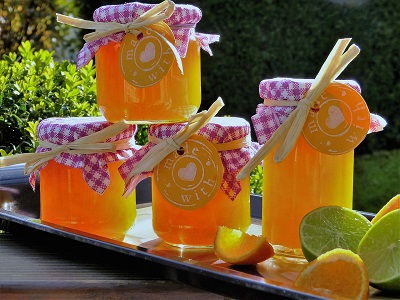
The UK’s Department for the Environment, Food and Rural Affairs (Defra) has published a memorandum about the changes. They intend to ‘engage with UK interested parties to assess the merits of the proposals and reach a view on whether it is in the best interest of the UK to consider similar changes.’ Isn’t it time that we reminded our politicians that we know how to read a product label and can make up our own minds about what we buy?
Now the UK is out of the EU, we have to let the market determine these things. Shoppers know what they like and more importantly how much they are prepared to pay for it.
– By Catherine McBride, Tuesday 20 June 2023
Observations
Brexit is about choice
The point here is choice. Brexit gives us choices which are not available in the authoritarian empire of the European Union. We are a country of over 70 million people (according to the supermarkets, who we think have a better idea than the Home Office). Surely we can make simple decisions about the products we buy without having a supranational foreign entity deciding for us?
CIBUK thanks its Affiliated Organisation, Brexit Facts4EU.Org for their research and permission to republish this article.
The Brexit Facts4EU.Org article can be found here.
Main image : montage © CIBUK.Org 2023



